Report of the 1st National Congress
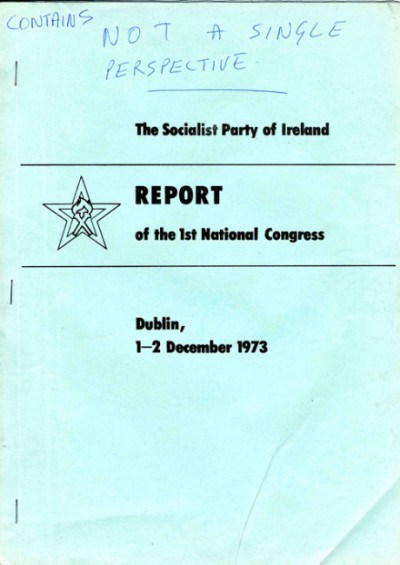
| Date: | December 1973 |
|---|---|
| Organisation: | Socialist Party of Ireland [1970] |
| View: | View Document |
| Discuss: | Comments on this document |
| Subjects: |
Please note: The Irish Left Archive is provided as a non-commercial historical resource, open to all, and has reproduced this document as an accessible digital reference. Copyright remains with its original authors. If used on other sites, we would appreciate a link back and reference to The Irish Left Archive, in addition to the original creators. For re-publication, commercial, or other uses, please contact the original owners. If documents provided to The Irish Left Archive have been created for or added to other online archives, please inform us so sources can be credited.
Commentary From The Cedar Lounge Revolution
27th November 2009
As a means of opening the discussion on the SPI the accompanying document was donated by Mark P (for which many thanks and many thanks also to the SP for allowing us access to some documents from their archive) and seems entirely suitable for the Open History Project. It provides a report by the Socialist Party of Ireland (not related to the contemporary Socialist Party) on their 1973 National Congress.
The SPI was a split from Official Sinn Féin which took place in 1971 with a small cadre believing that the larger group was overly exercised by the national question and insufficiently Marxist-Leninist. The SPI never achieved national prominence, but in adopting some positions not dissimilar to BICO (and working with BICO) it foreshadowed developments in the WP later in the day (and some of its members returned to OSF and later the WP). But the party ultimately merged in 1982 with some from BICO and Jim Kemmy’s Limerick group as the Democratic Socialist Party.
The Lost Revolution gives an overview of the genesis of the party as follows:
Internal unease at the perceived primacy of nationalist politics over social agitation resulted in several Dublin activists resigning from Sinn Féin in the aftermath of the 1971 Ard Fheis. Among those who left to set up the Socialist Party of Ireland (SPI) were former leading figures in the Dublin Housing Action Committee. most were also OIRA members who had already left following disputes over the movement’s political direction that surrounded the 1970 IRA General Army Convention. In order to help fund the new party, SPI supporters robbed £1,000 from a post office in Ballymun. Despite some allegations of intimidation, relations between SPI members and their former comrades remained relatively good, with several rejoining Sinn Féin within a few months. The new group would eventually adopt a view on the ‘national question’ strongly influenced by the British and Irish Communist Organisation’s ‘two-nations’ theory. It was openly pro-Soviet and unashamedly adopted Communist iconography. But outside of Ballymun, where it campaigned consistently on local issues, the SPI failed to make a discernable impact and never numbered much more than a few dozen activists.
The Lost Revolution doesn’t expand on the dispute at the Army Convention and that is a matter which would be worth exploring further.
Wikipedia gives a broader outline:
The Socialist Party of Ireland (SPI) (Cumann Sóisialachais na Éireann in Irish) was a minor left-wing political party which existed in Ireland from 1971 to 1980. The SPI was set up by ex-members of “official” Sinn Féin. It was formed on 13 December 1971 in Dublin and published its political manifesto on 19 January 1972. The SPI saw itself as a hard-line Marxist-Leninist alternative to the Communist Party of Ireland, which it criticised for its “blurred philosophy, loose structure, of discipline and unity”. The SPI opposed the friendly stance taken by the CPI towards official Sinn Féin, which it saw as a “mixture of petit-bourgeois radicals, nationalists and ultra leftists”. The SPI supported the Communist Party of the Soviet Union and the Moscow Declaration of 1969. It staged its first national congress in Dublin on 1–2 December 1973. The congress elected a seven member central committee comprising of Fergus Brogan, Desmond Hughes, Deirdre Uí Bhrógáin, Éamonn Ó Fearghail, Seamus Ó Reachtagáin, Fergus Quinlan, and Séamas Ó Brógáin. In the late 1970s, the party started discussions with several other groups with a similar policy on the National Question, including the British and Irish Communist Organisation (B&ICO) and the Limerick Socialists headed by Jim Kemmy. Eventually the three groups merged forming the Democratic Socialist Party (DSP) with one elected representative in the Dáil (Parliament). The DSP eventually merged with the Irish Labour Party which became a junior partner in a coalition government. During its life, the SPI was very active in campaigning for divorce (Divorce Action Group), contraception (Contraception Action Campaign), abortion (Right to Choose) and, in particular, opposition to nationalism and the campaign of the Provisional IRA (Socialists Against Nationalism). It supported the Two States Theory which accepted the right of the Unionist population of Northern Ireland to remain part of the United Kingdom until such time as a majority of the population choose otherwise by democratic means. The party’s head office was at 23 Parliament Street, Dublin 2. In 1976, it renamed itself the “Socialist Party”. Several SPI members ran as independents in Irish elections, the most successful being Eamonn O’Brien[1] from Ballymun, whose performance in achieving over six percent of the vote in the Dublin County North constituency in the 1977 General Election[2], encouraged Official Sinn Féin on the parliamentary road. He also joined the Workers Party and later the Labour Party and represented ballymun as a city councilor. The party’s publications, Vanguard and Advance, set a new standard for left-wing publications, using modern layout and photographs in a high quality reproduction format. On 1 December 1982, the Socialist Party dissolved itself into the Democratic Socialist Party.
That concentration on an activist approach to issues such as divorce and contraception is also of great interest for it foreshadowed a shift towards such issues by the left more generally during the 1980s. Clearly whoever wrote that had access to the Report of the 1st National Congress.
The Report itself neatly lays out the SPI line on a matter of topics, particularly in the opening speech from the Congress. Of considerable concern was the EEC, joined that year, the FG/Labour coalition, ‘preparations’ for a move away from neutrality, national wage agreements. This is couched in a language of direct confrontation with the state and the ‘treachery’ of the trade union movement.
On the North the party was clear that only by ‘bringing to the fore […] class issues’ could the situation be resolved and that it was certain ‘that campaigns of bombing and counter-bombing, murder and assassinations, produce only negative results which serve the interests of imperialism’.
On international relations the party welcomed ‘the constructive foreign policy of the Soviet Union [which] has made the greatest contribution to the establishment of an enduring peace based on mutual respect for sovereignty of states and non-interference by states in each other’s internal affairs. The Soviet/Federal Republic of Germany treaty has ended the cold war. The Soviet-American agreements make peaceful co-existence between the two great powers into a principle of state law’. It also lamented the overthrow of Allende in Chile.
One notable feature is the emphasis on party discipline. While this concept of ‘discipline’ isn’t enunciated entirely in full but is reiterated as a defining aspect of the party it is clear that it is bound up with an internal party structure which utilises democratic centralism and is posited as a distinction between them and Sinn Féin and indeed their perceived greatest rival on the left, for the Central Committee Report makes note of the following:
We must refer to the existence of the organisation called the ‘Communist Party of Ireland’, because it is as a direct consequence of its failure that two parties exist claiming revolutionary leadership of the Irish working class.
It continues:
The most obvious fault of the CPI – and the one which ensures that it will never gain mass support – is its capitulation, ideologically and organisationally, to Sinn Féin. The ‘official’ Sinn Féin organisation, with which the CPI is in permanent alliance is an unstable mixture of petty-bourgeois radicals, nationalists, and ultraleftists…
We must make it clear that our difference with the CPI is not just on their attitude to the national question. The truth is that the CPI lacks not just one but many – one might almost say all – of the characteristics of a communist party: and the logical and inevitable result of its vague philosophy, its loose structure and its lack of discipline and unity is its imminent collapse into opposing factions, which points to the absolute necessity for a new organisation.
This sense of distinctiveness permeates the document. But it’s also fair to point to the admission that:
The membership of our party is small – we are without doubt the smallest workers’ party in the world’
And yet, a most intriguing one at that whose influence on certain aspects of Irish political life may have been greater than their numbers. It’s hard at this remove to understand the trajectory of their development from more orthodox than the CPI to the DSP. More information gratefully accepted.
Addendum by WBS: I knew quite a few people in the WP who had been through the SPI, indeed the first time I heard about the SPI was probably in 84 in the party club having a pint at a table up against the street side surrounded by old-timers who looking back were probably barely out of their twenties but at the time seemed like wisdom incarnate. There was no question that even though they’d left and the party had disbanded at that stage they still had good memories of it, almost as if it were a rite of passage. Worth drawing attention to the annotations in the text of the document above by a later, rather more critical reader.
More from Socialist Party of Ireland [1970]
Socialist Party of Ireland [1970] in the archive
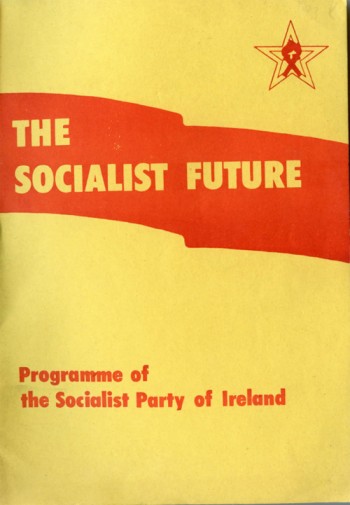
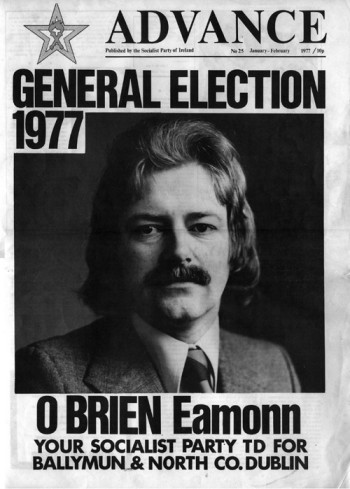
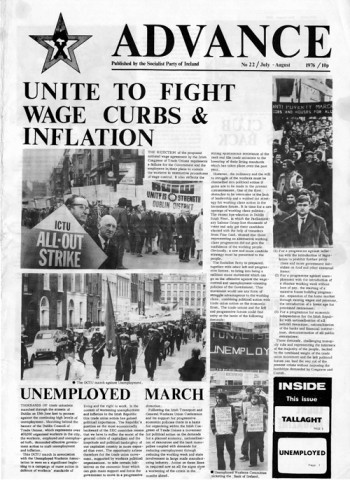
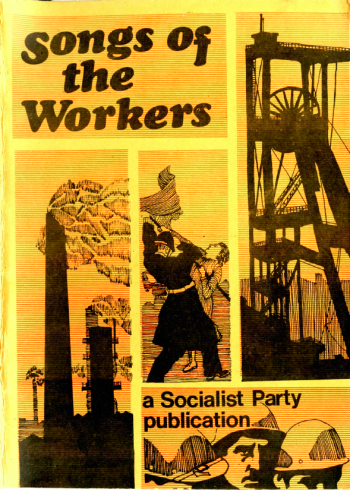
Comments
No Comments yet.
Add a Comment
Comments can be formatted in Markdown format . Use the toolbar to apply the correct syntax to your comment. The basic formats are:
**Bold text**
Bold text
_Italic text_
Italic text
[A link](http://www.example.com)
A link
You can join this discussion on The Cedar Lounge Revolution
By: Dr. X Tue, 01 Dec 2009 10:10:41
In reply to sonofstan.
‘A carnival of reaction, North and South’.
Reply on the CLR
By: Joe Tue, 01 Dec 2009 10:40:31
“being a unionist and socialist required considerable ideological acrobatics”.
I’m feeling fairly flexible this morning so here goes. A description of a potential unionist and socialist in the latter half of the 20th century:
He’s a Protestant from Northern Ireland. Defines himself as British and Irish. He admires the achievements of social democracy in Britain down the years – access to education for all, the NHS, the welfare state and so on. Likewise he admires great leaders of British social democracy like Keir Hardie and Nye Bevan. He admires Tony Benn. He is active in his trade union. Like most British socialists he doesn’t make abolition of the monarchy his number one priority. In an ideal world, he would want the monarchy abolished but he prefers to concentrate on day to day issues which promote social democracy. He is British and a unionist – that is he believes that Northern Ireland should remain part of the British state. But he does not support the unionist parties in Northern Ireland in terms of their historical sectarian discriminatory approach to the Catholic minority. He believes all people in Northern Ireland should be treated absolutely the same as people in the rest of Britain. He doesn’t see a lot to admire in the Republic of Ireland – its education, health and welfare systems are inferior to and less democratic than those in the British state. The undemocratic and basically evil influence of the Catholic church in all walks of life in the Republic also goes against his socialist beliefs.
Sounds plausible to me! Anybody know him? Maybe he’s even lurking on the site – c’mon out and identify yourself!
Btw, where’s Mark P when you need him? Doesn’t the SP favour a socialist confederation (aka union) of these islands?
Reply on the CLR
By: EamonnCork Tue, 01 Dec 2009 11:05:17
In reply to Dr. X.
He does not support the unionist parties in Northern Ireland in terms of their historical sectarian discriminatory approach to the catholic minority?
Our hypothetical friend was conspicuous by his absence in protests against the aforementioned sectarian discriminatory approach all the same.
And I’d agree that the Catholic church had an undemocratic influence on society in the Republic, I wrote a lengthy post on this two days ago. But I don’t like to see this influence used as a kind of conscience salve for people who wonder why the people in the Bogside and Creggan didn’t just stop whinging and get on with things.
Reply on the CLR
By: crocodile Tue, 01 Dec 2009 11:29:26
Does Joe’s putative northern socialist/unionist have a southern counterpart? To whom all of his description applies except, obviously, the first sentence?And for’ Like most British socialists he doesn’t make abolition of the monarchy his number one priority’ could you substitute ‘like most Irish socialists he doesn’t make reunification his number one priority’?
Reply on the CLR
By: Joe Tue, 01 Dec 2009 11:29:52
“Our hypothetical friend was conspicuous by his absence in protests against the aforementioned sectarian discriminatory approach all the same.”
Was he though? Was there not a small number of Protestants active and even prominent in the early civil rights stuff? Many e.g. Ivan Barr and Ivan Cooper were nationalists/republicans to be sure but were there not others who weren’t?
Also our hypothetical friend is a good socialist – so he dislikes both the clerical conservative state in the south and sectarian discrimination in the North. He doesn’t use the fact of the clerical conservative state in the South to justify discrimination in the North.
Reply on the CLR
By: EamonnCork Tue, 01 Dec 2009 11:36:20
In reply to Joe.
Given what you’ve said about him in the last paragraph, I think our hypothetical friend is acting in good faith. It’s a pity that he’s been marginalised to such an extent. Then again his hypothetical counterpart down here has hardly been at the centre of the action either.
Would Andrew Barr and Betty Sinclair have come into this category? Whatever your opinion of the Communist Party, I do think Barr showed a lot of courage in going into the shipyards during the UWC strike.
Reply on the CLR
By: Joe Tue, 01 Dec 2009 11:58:25
You’re a better researcher than me Eamonn. But I just put “Ulster socialist unionist” into Google. It threw up mostly stuff that wouldn’t fit my hypothetical friend but it also threw up (12th in the list):
‘Unionist Derry is Ulster’s Panama’: The Northern Ireland Labour Party and the Civil Rights Issue
Author: Aaron Edwards a (Show Biography)
Affiliation: a Royal Military Academy Sandhurst, UK
DOI: 10.1080/07907180802246685
Publication Frequency: 4 issues per year
Published in: Irish Political Studies, Volume 23, Issue 3 September 2008 , pages 363 – 385
Subjects: European Politics; Irish Politics;
Formats available: HTML (English) : PDF (English)
Article Requests: Order Reprints : Request Permissions
Single Article Purchase: £16.00 plus VAT – buy now add to cart [ show other buying options ]
purchase type customer type online access payment method price
Single Article Purchase Any 3 days, 1 user, 3 cookies credit card £16.00 plus VAT buy now add to cart
Issue Purchase Any permanent credit card £55.55 plus VAT buy now add to cart
Members of the Political Studies Association of Ireland receive the journal for free as part of their membership.
To join the PSAI, you can complete a membership form
Sign In Online Sample
View Article: View Article (PDF) View Article (HTML)
Abstract
Debates over the nature, significance and legacy of the Northern Ireland civil rights movement tend to stress its Catholic and irredentist character. This article takes a different approach by examining the role of those activists from a Protestant and socialist background who played important roles in agitating for redress of socio-economic and political grievances. In particular, the article focuses on the involvement of individual members of the bi-confessional Northern Ireland Labour Party (NILP) in the civil rights movement in the 1960s. It considers the NILP’s relationship to other civil rights bodies, such as the Campaign for Social Justice and the Campaign for Democracy in Ulster, and asks how its approach differed …
We might find him in there?
Reply on the CLR
By: Mark P Tue, 01 Dec 2009 13:26:49
In reply to Joe.
The Socialist Party’s policy is for a united socialist Ireland within a voluntary federation with a socialist Scotland, England and Wales, as part of a broader international federation. It’s a bit wordy as slogans go.
To some extent or other, this is implicitly the policy of all socialist formations which don’t adhere to the Stalinist line of socialism in one country (and I suspect that even some Stalinists would balk at the idea that socialism is possible in one island of 6 million!). The Socialist Party is only unusual in two regards: It is explicit about it and it emphasises the fact that Scotland, England and Wales would also be part of a viable socialist federation. It does this to make it clear that workers in Britain are our strongest potential allies and not our enemies and also to reassure unionists in Ireland.
As far as people who consider themselves socialists and unionists are concerned, well you won’t find any in the SP or I suspect the CP, the other socialist formation with a lot of members from a Protestant background. You used to get quite a substantial number of them in the NILP though.
Reply on the CLR
By: Tim Tue, 01 Dec 2009 14:24:06
In reply to Joe.
Joe -I’ve known a few people that fit that description, including a former teacher of mine who was also involved in the civil rights movement. He told me he left when it was clear ‘liberals’ were, he felt, being purged from the movement in favour of a more radical approach.
I was briefly a member of the SP, as I found their approach to Northern Ireland the most palatable.
Reply on the CLR
By: Fergus D Tue, 01 Dec 2009 14:59:08
So far the discussion has stressed and civil rights and economic issues for Northern “Catholics”. That isn’t the main issue for “Irish Republicans” though is it? They traditionally stressed “national rights” i.e. the right to national self-determination encompassing the whole island and therefore the “majoritarian” argument that Ireland should never have been partitioned and that majority wish was for a unitary independent state. Unrealistic as that may have been. But there you have a fundamental difference between those who focus on “republicanism” (I think we should use Irish nationalism as a better term) and socialists who are very much concerned with class and economic power.
But maybe part of the issue then for Northern “Catholics” was that they felt “trapped” in a state they didn’t want. Maybe even if the economic circumstances had been better, and maybe the discrimination absent, they would still have resented being included in NI? Even if you accepted partition (as an unavoidable necessity) the border itself was clearly unfair. I don’t know if that was/is they way they felt, but it is possible and may have dtermined the course of events. After all the SDLP has become a nationalist more than a socialist party it seems to me. Similarly maybe unionists weren’t “half crown” unionists (i.e. economically driven) but at least just as importantly ideologically driven, both by their “nationalism” and religion. However, I think it is a complex issue where within either “side” there actually some quite important divisons (class, religiosity, “nationalism” e.g. on the non-Irish nationalist side: Ulster vs “British”).
As for republican/unionist socialists I found “Explaining Northern Ireland” by McGarry and O’Leary (1995) quite interesting:
http://tinyurl.com/yb4u6eq
Green Marxists (OIRA, much of the British far left), Red Marxists (Militant Tendancy) and Orange Marxists (BICO at least then!) interesting!
Reply on the CLR
By: Joe Tue, 01 Dec 2009 15:00:48
In reply to Tim.
So it appears that YES it is possible to be a socialist and a unionist all at the same time! What say you WBS? Cad deir tú a NollaigO?
EamonnCork, I’ll see your Betty Sinclair and Andy Barr with a Sam McAughtry.
Reply on the CLR
By: Tim Tue, 01 Dec 2009 15:28:04
In reply to EamonnCork.
“I’m surprised anyone would make an apologia for the Stormont state” I hope my remarks weren’t taken in that way. Of course there was repression, but in the context of the 1950s, say, it was mild, when many European countries had dictators and the spectre of the Eastern Bloc was emerging. Perspective, not denial.
Interesting quote – but it turns out even Paisley was right about child sexual abuse in the Catholic Church!
Reply on the CLR
By: Joe Tue, 01 Dec 2009 16:03:23
In reply to crocodile.
I hope he has Crocodile! And one day the two of them will meet up and form a great movement of non-sectarian progressive socialists that recognises that there are two (however shall I phrase this!) national groupings on this island but that the task of socialists is to work together to build a world, North and South, East and West, in which … you lot know the rest I hope because I seem to have forgotten.
Reply on the CLR
By: Joe Tue, 01 Dec 2009 16:12:59
In reply to WorldbyStorm.
Well WBS, one of those listed above on the SPI’s executive in 1973 went on to join the WP in Dublin Nth East in 1987ish – Des Hughes. Des went on to become a full-time official with SIPTU. He’s retired now but still hale and hearty – I met him on the ICTU protest march a few weeks back.
At least one other major player in the anti-McCartan majority in Dublin Nth East at the time was also ex-SPI as far as I know. WP and later Labour Cllr Eamon O’Brien in Ballymun was another.
Reply on the CLR
By: Crocodile Tue, 01 Dec 2009 18:20:24
In reply to Joe.
Yeah, Joe. Like… what’s so funny ’bout peace, love and understanding?
Reply on the CLR
By: WorldbyStorm Tue, 01 Dec 2009 19:42:02
In reply to Tim.
Well my initial response was…
Hmmmm… I’m in various minds about that. I think yes one can, but… I think it’s interesting that left wing thinking in the Unionist party and the PUP more recently seems to have linked back more to the Protestant working class than the working class in general (that’s a bit of a generalisation but Dawn Purvis’ comments on the Stormont regime recently are instructive in that regard). Issues of relationships to power come into play there (some might call it imperialism, but I’m leery about that term for various reasons too arcane to detail here).
So presumably it was yes from the off. I don’t think one can be a member of the UUP or DUP and be a socialist. I think it is possible to be in the PUP and be a socialist. I can envisage a left Unionist party albeit, one that eschewed Stormont or majority rule and based its approach in socialism and something like civic unionism – perhaps that’s what the PUP is evolving into. Albeit that sounds like a left version of the Alliance Party… But… there remain problems. If one has issues with the left Republican viewpoint then equally one should have issues with a left Unionist viewpoint since both are effectively rooted in competing nationalisms.
On the other hand, and I think there’s some evidence for this, it’s possible that through left parties the two nationalisms might move towards a process of accommodation and respect for each other and engagement on practical issues. Maybe.
Incidentally, I’m not hugely gone on the notion that you can’t have socialism with only 6 million people.
Reply on the CLR
By: WorldbyStorm Tue, 01 Dec 2009 19:45:26
In reply to Fergus D.
Nice one Fergus D… a lot of food for thought there. I think you point to a clear problem re the issue of Catholics/Nationalists trapped in a state which accorded them no sense of their identty, which from the off couldn’t for it saw any compromise on that issue as a fundamental betrayal. Indeed one could argue that for all the repressive social legislation the Senate seats in the South were considerably more politically in terms of a gesture than was ever offered to Nationalists in the North. And it’s interesting to me that that tradition remains extant to the point that Ross and Norris (albeit in a restricted constituency) still represent echoes of it…
Reply on the CLR
By: Big Bad Bob Wed, 07 Apr 2010 15:21:45
In reply to WorldbyStorm.
John,
If she’s so “pro-European”, why did she sign up with the DUP and the Wintertons to a referendum on Lisbon?
If she’s so “liberal”, why is her voting record on gay rights somewhat mixed?
Oh, and why, by the way, did she vote for the Iraq War but against any inquiry into it?
Just for the record, she’s pro-nuclear too.
One just hopes the electorate of North Down are not similarly fooled.
Reply on the CLR
By: Joe Davis Tue, 02 Aug 2011 22:12:19
In reply to Joe.
Hi,
I ‘m Joe too (Joe2) ?
Im also proud to have been an active member of the SPI during the 1970s. Setting national party ideals back then was idealist, and impossibly so. Most of us were probably close to burnout by the 1977 Local Election. That 6% of the vote was never the result of Christian Socialist prayer-meetings, but the massive commitment to the “Learning by Doing” exercise which it was, of course.
Jioe Davis
Reply on the CLR
By: WorldbyStorm Wed, 03 Aug 2011 07:40:41
In reply to Joe.
Joe, that’s great stuff. Quick question, just on foot of what others have asked here, how is it some people from the SPI went in with the DSP? It just seems much less rigorous than the SPI.
Reply on the CLR